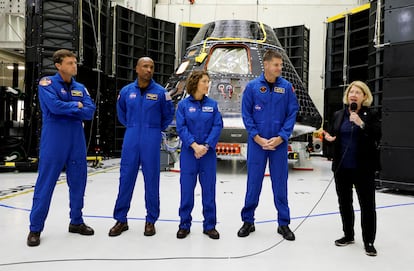NASA postpones moon landing until at least 2026 due to problems with private spacecraft
Artemis II will carry a manned mission to lunar orbit in September 2025 and Artemis III will land on the moon in September 2026


The Moon will have to wait. NASA announced Tuesday that it would delay its schedule for the Artemis Moon exploration program, which is meant to serve as a first step for the arrival of human beings on Mars. At a press conference in Washington, its administrator, Bill Nelson, indicated that the Artemis II mission, which was to take astronauts into lunar orbit for the first time in half a century in September of this year, will be postponed until September 2025. The Artemis III mission, which was to take four astronauts to the South Pole of the Moon in 2025, is postponed until September 2026. The Artemis IV mission remains on schedule for launch in 2028.
“Safety is our top priority, and to give Artemis teams more time to work through the challenges with first-time development, operations and integration, we’re going to give more time on Artemis II and III,” NASA administrator Bill Nelson said Tuesday.
The first mission, Artemis I, was successfully completed in December 2022. Then, the Orion capsule, launched without cargo, orbited the Moon and returned to Earth on schedule. Five months later, NASA announced the astronauts selected for the first manned mission, Artemis II: Canadian Jeremy Hansen and Americans Reid Wiseman, Christina Koch and Victor Glover. Koch and Glover are, respectively, the first woman and the first Black person to participate in a lunar mission.
Tuesday’s announcement represents a blow to U.S. space aspirations. The agency is counting on the Artemis missions to bring back the space euphoria the country experienced with the first lunar landing nearly 55 years ago, as well as establish the United States as a leader in an increasingly hotly contested race for the conquest of outer space. In just a few years, China has become a fierce rival in the race to get back to the Moon.
Nevertheless, the postponement of the Artemis program had been a foregone conclusion for weeks. In November, NASA’s inspector general had pointed to a number of problems in the program that must be corrected in order for the ambitious and very expensive initiative to continue. Among them, the report indicated that the thermal envelope that was to protect the Orion capsule from the heat and friction generated by friction with the atmosphere on its descent to the Earth’s surface had worn more than expected on Artemis I. In addition, the immense platform designed to carry, support and launch the colossal SLS rocket that is to carry Orion out of Earth orbit also suffered more damage than calculated for the 2022 launch.
In addition to the setbacks to the schedule, the special spacesuits for the Moon that the Artemis crew needs for their mission, which are being provided by Axiom Space and Collins Aerospace, are also not ready. The lunar lander based on SpaceX’s Starship spacecraft is also not ready.
Sign up for our weekly newsletter to get more English-language news coverage from EL PAÍS USA Edition
Tu suscripción se está usando en otro dispositivo
¿Quieres añadir otro usuario a tu suscripción?
Si continúas leyendo en este dispositivo, no se podrá leer en el otro.
FlechaTu suscripción se está usando en otro dispositivo y solo puedes acceder a EL PAÍS desde un dispositivo a la vez.
Si quieres compartir tu cuenta, cambia tu suscripción a la modalidad Premium, así podrás añadir otro usuario. Cada uno accederá con su propia cuenta de email, lo que os permitirá personalizar vuestra experiencia en EL PAÍS.
¿Tienes una suscripción de empresa? Accede aquí para contratar más cuentas.
En el caso de no saber quién está usando tu cuenta, te recomendamos cambiar tu contraseña aquí.
Si decides continuar compartiendo tu cuenta, este mensaje se mostrará en tu dispositivo y en el de la otra persona que está usando tu cuenta de forma indefinida, afectando a tu experiencia de lectura. Puedes consultar aquí los términos y condiciones de la suscripción digital.








































